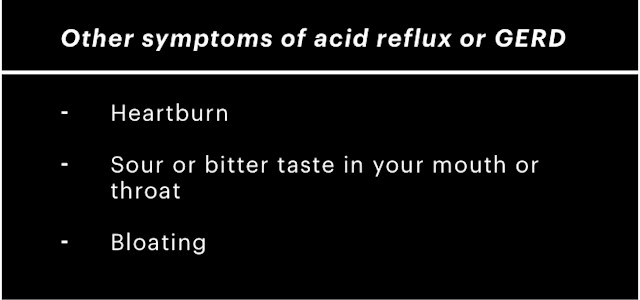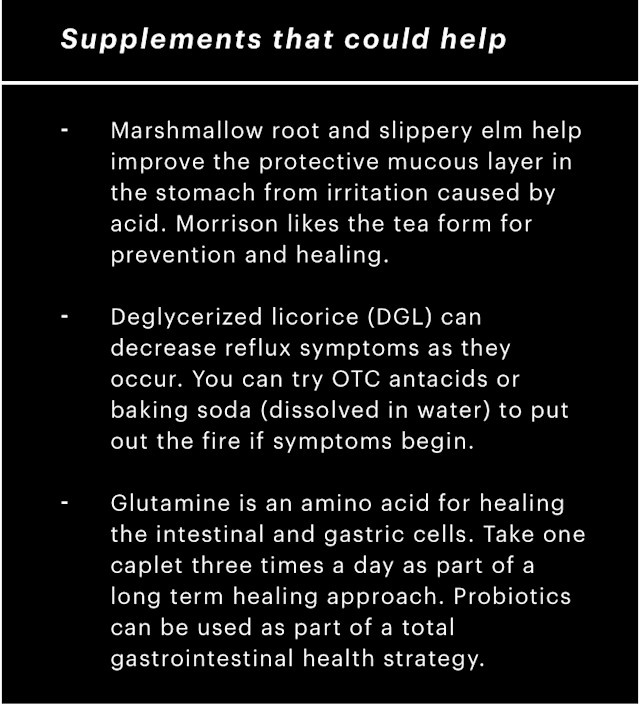Anxiety could be the culprit.
Like a popcorn kernel is stuck in my throat. That’s how I described my symptoms to an ENT that diagnosed me, a 31-year-old otherwise healthy and active woman, with acid reflux. I thought reflux was a result of eating fatty, fried food and leading a sedentary lifestyle. It’s something I heard my parents and uncles complaining about after eating my grandmother’s famous spaghetti and meatballs. That is, until I started to research the condition and share my own experience with my peers.
To my surprise, the most common reaction to admitting that I can’t share the Margherita pizza because the tomatoes will aggravate my reflux or that I need an earlier dinner reservation because I’ve been warned against late-night meals was: “Oh, I have that too.” Or: “My husband was diagnosed with silent reflux just before our wedding.” Or: “Yeah, I had to elevate the head of my bed to prevent overnight reflux.” It seemed like every young, healthy person I knew in New York City had dealt with this in some form in recent times. It made me wonder: What’s going on?
To find out if my hunch was correct, I called Jeffrey Morrison, MD, a member of the Equinox Health Advisory Board and founder of The Morrison Center in New York City. “So it's true,” he said, “We also are seeing an increased number of patients who are coming in with digestive issues that are related to reflux and indigestion and heartburn.” Ekta Gupta, MD, assistant professor of medicine at Johns Hopkins University’s department of gastroenterology and hepatology in Baltimore, Maryland agreed that there’s been an uptick in cases, in Millenials in particular. “I’ve noticed the trend in my practice,” she says.

The healthy habits that can cause reflux
One possible explanation for GERD: your sparkling water habit. Carbonated beverages tend to relax the bottom of the esophagus, per Gupta. When the lower esophageal sphincter (LES), a muscle at the entrance of your stomach, is relaxed, acid from your stomach can pass back up into the esophagus. If it happens often, it gets diagnosed as GERD (gastrointestinal reflux disease).
Other popular drinks that have the same effect include coffee (caffeine is a trigger), energy drinks (a double whammy as they’re often carbonated and caffeinated), and alcohol of any sort. You shouldn’t go cold turkey on any of these delightful things if you’re not experiencing symptoms. But you should partake in moderation. “People think they’re doing a good thing by drinking sparkling water as a way to stay hydrated, but there is such thing as too much of a good thing,” says Gupta.
The anxiety-stress connection
Here’s where things got even more interesting to me. I came across several articles and studies that linked reflux to anxiety, stress, and depression. As someone who has dealt with anxiety since freshman year of college, I was immediately intrigued—it would make total sense that anxiety was the culprit behind this sudden onset of reflux.
A 2017 study in the World Journal of Gastroenterology concludes: “Psychological factors, including anxiety and depression, play an essential role in the development of GERD and especially that of NERD (nonerosive reflux disease).” Other studies have suggested that anxious or depressed people or more likely to develop reflux symptoms. This Swedish study from 2007 found that people with anxiety had a 3.2-fold increased risk of reflux symptoms while those with depression had a 1.7-fold increased risk.
When I asked Dr. Morrison about this, he wasn’t surprised. “In New York City, most people would admit that they are generally running on adrenaline, keeping their energy levels up, stretching the day to its longest amount of time,” he said. “Running on adrenaline and stress means that they're running on fight or flight, or the sympathetic nervous system.” That’s a problem because your digestive tract does not activate in fight or flight. “It’s evolutionary, you're not supposed to be digesting your food when you're running away from a tiger which is what that system was designed to help you do,” says Morrison. “If a person is not digesting properly, then the food just sits in the stomach, and then keeps on refluxing back up.”

Furthermore, our bodies normally produce prostaglandin, a fatty acid that protects the stomach lining from acid exposure. “Stress and anxiety cause a reduction in prostaglandin, which makes a person more susceptible to acid reflux symptoms and can even cause ulcers,” says Gupta.
“You’re doing your best digestion when you are in the parasympathetic nervous system, in a relaxed state,” Morrison says. Read: sitting down, cutting up your food, and chewing it up calmly. But these days, most of us are probably eating while we’re on our phone or computer, which “makes digestion terrible,” per Morrison. The fix sounds simple and is something you’ve probably heard a hundred times—eat mindfully to prevent and alleviate reflux. “It’s best to eat when disconnected from social media or better yet, while spending time with someone or something that makes you happy,” says Morrison. For those that have trouble doing this at first, stick to cooked foods (rather than raw veggies) as they’re easier to digest and of course, avoid acidic food which aggravate inflammation in the stomach.
Bigger picture, you need to relax. “I talk to my patients about engaging in ‘me time’, something that helps them deal with day-to-day stress like going for a run, watering their plants, yoga or meditation or Thai Chi,” says Gupta.
The breathing fix
Chest breathing activates the sympathetic nervous system. Belly breathing, on the other hand, helps the diaphragm to stretch out with each breath, and helps put you in a parasympathetic state. Try a breathing exercise like this one or this one before each meal to help you activate the parasympathetic nervous system.
The bottom line
If your symptoms persist, you should see your doctor to rule out other possibilities including stomach inflammation. Chronic acid exposure also puts people at risk for certain conditions, which can be precancerous, such as Barrett's esophagus. “We have continued evidence from recent research to convince our younger folks about the importance of diet and lifestyle and stress management,” Gupta says.
